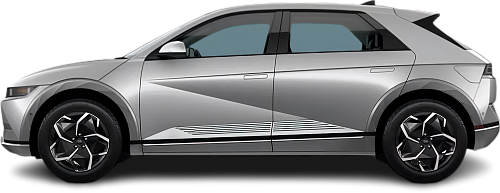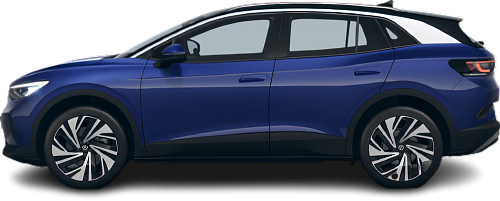Global EV Comparison: Hyundai Ioniq 5 Standard Range RWD vs Volkswagen ID.4 Pure
Struggling to Decide? Let AI Help!
Your AI Summary Is Ready!
General Info
The Volkswagen ID.4 Pure (2023-…) is currently produced, it has a starting price of €40335. The Hyundai Ioniq 5 Standard Range RWD (2021-2024) has been discontinued. You can find it for as low as €23250 on the used car market.
The two vehicles share the same body style: SUV.
| Property | Hyundai Ioniq 5 Standard Range RWD | Volkswagen ID.4 Pure |
|---|---|---|
| Years of Production | 2021-2024 | 2023-… |
| Current Status | Discontinued | Produced |
| Country of Manufacture | Indonesia, Singapore, South Korea | Germany |
| Body Style | SUV | SUV |
| Market Availability | EU, USA | EU |
| Price Europe (New) | - Price Europe (New) | €40335 |
| Price Europe (Used) | €23250 | €26290 |
| GCC Score | 6.5 | 6 |
Range and Efficiency
The Hyundai Ioniq 5 Standard Range RWD (2021-2024) boasts a greater real-world range, a larger battery, and superior energy efficiency compared to the Volkswagen ID.4 Pure (2023-…).
| Property | Hyundai Ioniq 5 Standard Range RWD | Volkswagen ID.4 Pure |
|---|---|---|
| Range (EPA) | 354 km | - Range (EPA) |
| Range (WLTP) | 400 km | 364 km |
| Range (GCC) | 341 km | 318 km |
| Battery Capacity (Nominal) | 58 kWh | 55 kWh |
| Battery Capacity (Usable) | 54 kWh | 52 kWh |
| Efficiency per 100 km | 15.8 kWh/100 km | 16.4 kWh/100 km |
| Efficiency per kWh | 6.31 km/kWh | 6.12 km/kWh |
| Range and Efficiency Score | 6.7 | 6.3 |
Charging
The Hyundai Ioniq 5 Standard Range RWD (2021-2024) features an advanced 800-volt architecture, whereas the Volkswagen ID.4 Pure (2023-…) relies on a standard 400-volt system.
The Hyundai Ioniq 5 Standard Range RWD (2021-2024) offers faster charging speeds at DC stations, reaching up to 175 kW, while the Volkswagen ID.4 Pure (2023-…) maxes out at 145 kW.
Both vehicles are equipped with the same on-board charger, supporting a maximum AC charging power of 11 kW.
| Property | Hyundai Ioniq 5 Standard Range RWD | Volkswagen ID.4 Pure |
|---|---|---|
| Max Charging Power (AC) | 11 kW | 11 kW |
| Max Charging Power (DC) | 175 kW | 145 kW |
| Architecture | 800 V | 400 V |
| Charge Port | CCS Type 2 | CCS Type 2 |
| Charging Score | 6.9 | 5.9 |
Performance
Both vehicles are rear-wheel drive.
Both cars offer the same motor power, but the Hyundai Ioniq 5 Standard Range RWD (2021-2024) achieves a faster 0-100 km/h time.
| Property | Hyundai Ioniq 5 Standard Range RWD | Volkswagen ID.4 Pure |
|---|---|---|
| Drive Type | RWD | RWD |
| Motor Type | PMSM | PMSM |
| Motor Power (kW) | 125 kW | 125 kW |
| Motor Power (hp) | 168 hp | 168 hp |
| Motor Torque | 350 Nm | 310 Nm |
| 0-100 km/h | 8.5 s | 9 s |
| Top Speed | 185 km/h | 160 km/h |
| Performance Score | 3.7 | 3.1 |
Dimensions
The Hyundai Ioniq 5 Standard Range RWD (2021-2024) is wider, but has a similar length and height to the Volkswagen ID.4 Pure (2023-…).
The Hyundai Ioniq 5 Standard Range RWD (2021-2024) boasts a more extended wheelbase.
| Property | Hyundai Ioniq 5 Standard Range RWD | Volkswagen ID.4 Pure |
|---|---|---|
| Length | 4635 mm | 4584 mm |
| Width (with Mirrors) | 2152 mm | 2108 mm |
| Width (w/o Mirrors) | 1890 mm | 1852 mm |
| Height | 1605 mm | 1634 mm |
| Wheelbase | 3000 mm | 2770 mm |
Cargo and Towing
The Volkswagen ID.4 Pure (2023-…) features a larger trunk, but the Hyundai Ioniq 5 Standard Range RWD (2021-2024) offers greater maximum cargo capacity when the rear seats are folded.
A frunk (front trunk) is available in the Hyundai Ioniq 5 Standard Range RWD (2021-2024), but the Volkswagen ID.4 Pure (2023-…) doesn’t have one.
The Volkswagen ID.4 Pure (2023-…) is better suited for heavy loads, offering a greater towing capacity than the Hyundai Ioniq 5 Standard Range RWD (2021-2024).
| Property | Hyundai Ioniq 5 Standard Range RWD | Volkswagen ID.4 Pure |
|---|---|---|
| Number of Seats | 5 | 5 |
| Curb Weight | 1905 kg | 1987 kg |
| Cargo Volume (Trunk) | 531 l | 543 l |
| Cargo Volume (Max) | 1591 l | 1575 l |
| Cargo Volume (Frunk) | 57 l | - Cargo Volume (Frunk) |
| Towing Capacity | 750 kg | 1000 kg |
| Cargo and Towing Score | 7 | 6.9 |




